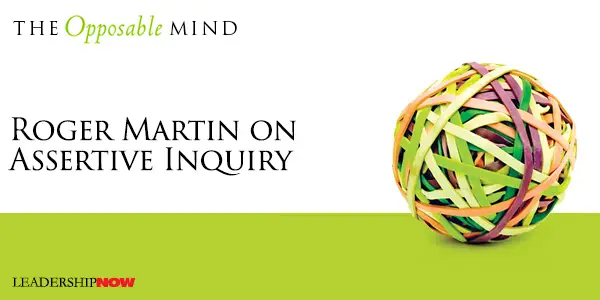 |
 |
12.07.07

Roger Martin on Assertive Inquiry READERS have had some questions about "assertive inquiry" as presented in Roger Martin’s book The Opposable Mind. Here are some explanatory excerpts from the book:
READERS have had some questions about "assertive inquiry" as presented in Roger Martin’s book The Opposable Mind. Here are some explanatory excerpts from the book:
“When we interact with other people on the basis of a particular mental model, we usually try to defend that model against any challenges. Our energy goes into explaining our model to others and defending it from criticism. “The antidote to advocacy is inquiry, which produces meaningful dialogue. When you use assertive inquiry to investigate someone else’s metal model, you find saliencies that wouldn’t have occurred to you and causal relationships you didn’t perceive. You may not want to adopt the mental model as your own, but even the least compelling model can provide clues to saliencies or causal relationships that will generate a creative solution.” Ask:
Not:
Obviously tone is important here. If your attitude is one of really seeking to understand and build bridges, it will come across. Otherwise, it is just another way you’ve picked up to try to argue your point and that will come across too. Martin continues, “Assertive inquiry isn’t a form of challenge, but it is pointed. It explicitly seeks to explore the underpinnings of you own model and that of another person. Its aim is to learn about the salient data and causal maps baked into another person’s model, then use the insight gained to fashion a creative resolution of the conflict between that person’s model and your own.” 
Posted by Michael McKinney at 08:38 AM
|
BUILD YOUR KNOWLEDGE
 

How to Do Your Start-Up Right STRAIGHT TALK FOR START-UPS 
Grow Your Leadership Skills NEW AND UPCOMING LEADERSHIP BOOKS 
Leadership Minute BITE-SIZE CONCEPTS YOU CAN CHEW ON 
Classic Leadership Books BOOKS TO READ BEFORE YOU LEAD |